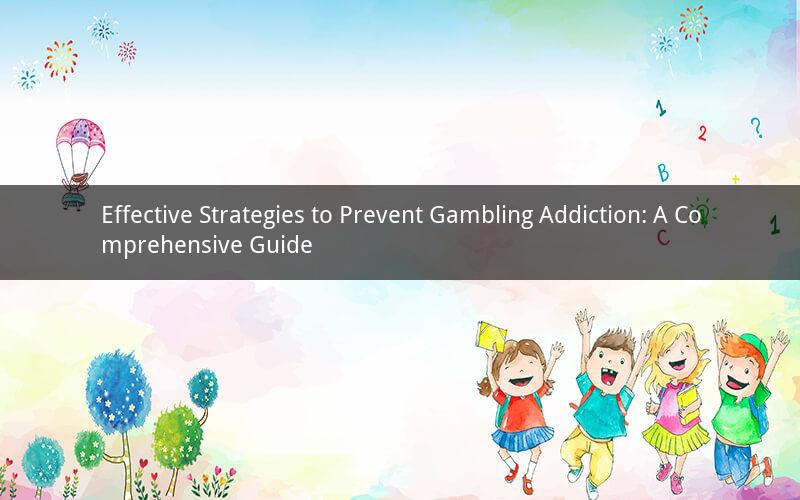
Introduction:
Gambling addiction is a significant issue that affects individuals, families, and communities worldwide. It can lead to severe financial, emotional, and social consequences. This article explores effective strategies to prevent gambling addiction, providing a comprehensive guide for individuals and organizations aiming to create a safe and responsible gambling environment.
1. Understand the Risks and Consequences:
One of the first steps in preventing gambling addiction is to be aware of the risks and consequences associated with excessive gambling. Educating oneself about the potential negative impacts on mental health, finances, relationships, and overall well-being is crucial. Here are some key risks and consequences to consider:
- Financial Loss: Excessive gambling can lead to significant financial loss, including debts, loss of savings, and even bankruptcy.
- Mental Health Issues: Gambling addiction can trigger or worsen mental health conditions such as depression, anxiety, and substance abuse.
- Emotional and Social Consequences: Relationships may suffer due to financial strain, emotional instability, and social isolation caused by gambling addiction.
- Legal and Criminal Issues: In some cases, gambling addiction may lead to illegal activities, such as fraud or theft, to support gambling habits.
2. Set Clear Limits and Boundaries:
Establishing clear limits and boundaries is essential in preventing gambling addiction. Here are some effective strategies:
- Budgeting: Allocate a specific amount of money for gambling activities and stick to it strictly. Avoid using credit cards or taking loans to fund gambling.
- Time Management: Set a specific time limit for gambling sessions and stick to it. Avoid gambling excessively or for extended periods.
- Self-Exclusion: If you find it challenging to control your gambling behavior, consider self-exclusion programs offered by casinos and online gambling platforms.
- Seek Support: Engage in support groups or counseling sessions to help you maintain your boundaries and develop healthier gambling habits.
3. Promote Responsible Gambling:
Creating a responsible gambling environment involves several measures, both for individuals and organizations. Here are some key strategies:
- Education and Awareness: Increase awareness about the risks and consequences of gambling addiction through educational campaigns, workshops, and training programs.
- Age Verification: Implement strict age verification processes to ensure that only individuals of legal gambling age can access gambling services.
- Deposit Limits: Set reasonable deposit limits to prevent excessive spending and encourage responsible gambling.
- Gamblers Anonymous and Support Groups: Promote and support the availability of Gamblers Anonymous and other support groups for individuals struggling with gambling addiction.
4. Foster a Supportive Environment:
Creating a supportive environment can significantly reduce the risk of gambling addiction. Here are some ways to foster a supportive environment:
- Family and Friends: Encourage open communication with family and friends about gambling habits. Offer support and understanding rather than judgment.
- Mental Health Support: Promote mental health support services and encourage individuals to seek help if they are struggling with gambling addiction or other mental health issues.
- Workplace Support: Implement workplace policies that promote a healthy work-life balance, including reasonable working hours and access to mental health resources.
- Community Involvement: Engage in community initiatives that promote responsible gambling and provide resources for individuals at risk of addiction.
5. Stay Informed and Educated:
Keeping up-to-date with the latest research and information on gambling addiction is crucial in preventing its occurrence. Here are some ways to stay informed:
- Research and Readings: Read articles, books, and research papers on gambling addiction to gain a deeper understanding of the issue.
- Professional Organizations: Join professional organizations and attend conferences to network with experts in the field and stay informed about the latest developments.
- Online Resources: Utilize online resources such as websites, forums, and social media platforms to connect with others and access support.
Questions and Answers:
1. What are the signs of gambling addiction?
Gambling addiction can manifest through various signs, including preoccupation with gambling, increasing the stakes to sustain excitement, lying to hide gambling activities, experiencing mood swings, and neglecting responsibilities.
2. Can gambling addiction be treated?
Yes, gambling addiction can be treated. Various treatment options are available, including therapy, counseling, support groups, and in some cases, medication. It is crucial to seek professional help if you suspect you or someone you know is struggling with gambling addiction.
3. How can I help a loved one struggling with gambling addiction?
Supporting a loved one with gambling addiction involves providing a safe and non-judgmental space, encouraging them to seek professional help, and offering empathy and understanding. It is important to set boundaries and maintain your own well-being while supporting your loved one.
4. Are there any legal measures to prevent gambling addiction?
Yes, several legal measures can be implemented to prevent gambling addiction. These include setting legal gambling age limits, implementing deposit limits, promoting responsible gambling campaigns, and regulating the operation of gambling establishments.
5. Can technology help prevent gambling addiction?
Yes, technology can play a significant role in preventing gambling addiction. Online tools and apps can help individuals monitor their gambling behavior, set limits, and receive notifications when they exceed those limits. Additionally, technology can be used to promote responsible gambling campaigns and provide access to support resources.